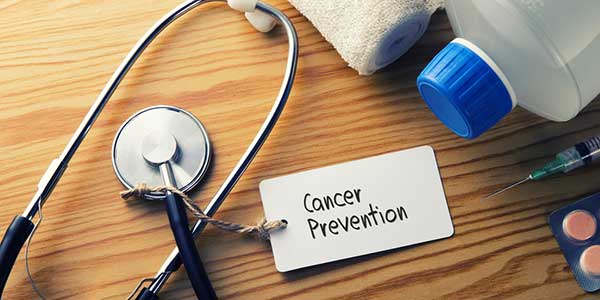
Cancer is the second leading cause of death in the U.S., right behind heart disease, and affects about one out of every three Americans. But despite the overwhelming statistics, researchers and healthcare experts continue working towards improvements in the diagnosis and treatment of cancer. But instead of waiting for a diagnosis or that hopeful cure, be proactive with these cancer prevention tips!
How to Prevent Cancer: 14 Tips
1. Offer Color to the Diet
Diets rich in color from nutritious fruits and veggies may lessen caner risk, particularly related to the protective properties powerful antioxidants offer. Colorful, cancer-prevention produce includes artichokes, broccoli, cauliflower, onions, kiwi, grapes, and tomatoes.
2. Reduce High-Fat and Processed Meats
The displacement of wholesome produce, which provides valuable fiber and nutrients, and consumption of high fat and sodium meats is a theory connecting such link to heart disease and cancer. Limit the intake of sausage, bacon, and other processed meats to once a month and red meats, such as steak, to approximately a serving or two each week. Cooking meats on lower temps, rather than high heat from grills, may also lessen the risk of cancer.
3. Eat Wild Fatty Fish
If an avid consumer of the meats above, doing away with them may spark concern of inadequate protein intake. But do not fret, as consuming fatty fish offers significant protein while also lessening the risk of colon, blood, and endometrial cancers thanks to its potent anti-inflammatory effects. To reap said benefits, consume at least two servings of salmon, halibut, sardines, and tuna.
4. Ditch Sugary Drinks
Soda and other sugary drinks merely supply calories without any sort of nutritional value. Diets high in sugar not only heightens the risk of obesity and diabetes, but may even increase the risk of cancer. In fact, a study conducted by the University of Minnesota School of Public Health in Minneapolis found postmenopausal women who consumed sugar-sweetened beverages were more likely to develop endometrial cancer compared to women who went without such beverages.
5. Go Green
Ditch the sugary drinks and go green with tea. Green tea contains polyphenols, compounds suggested to reduce tumor growth and protect against harmful UVB radiation, a significant risk factor for skin cancer. Though not a primary preventative or treatment option, studies have shown positive impacts of green tea on cancers including bladder, breast, esophageal, lung, skin, and stomach cancers. Statistics have also related countries who consume large amounts of green tea tend to display lower cancer rates.
6. Exercise Regularly
Though living an active lifestyle is an established component of maximizing health, a report from the American Institute for Cancer Research;discusses more evidence of exercise for cancer prevention. In fact, a large study pooled of 1.4 million people suggests exercise may play a role in healthy survivorship and lessening the risk of 13 cancers, including breast, endometrial, colon, liver and stomach cancers.
7. Maintain Weight
The implementation of a healthy diet and regular exercise can facilitate weight loss and allow maintenance to occur. Lean individuals have a reduced risk of developing cancer, most likely related to minimized chronic inflammation in the body.
8. Stop Smoking and Tobacco Use
Cigarette smoke and tobacco use is one of the leading causes of cancer, also contributing to a 30 percent mortality or death rate. Excessive alcohol consumption can also increase cancer risk, even white wine showing a link to melanoma. If you are to drink, recommendations suggest men consume no more than two servings while women are limited to one.
9. Obtain Vitamin D
Vitamin D shows great worth in reducing cancer risk, as the vitamin helps promote proper cell development and disruptions in these processes may cause cancer growth. Additionally, vitamin D deficiency has been associated to a higher risk of breast, colon, prostate, ovarian, and stomach cancers. Food sources of vitamin D include eggs, beef, fish and fortified products such as milk and orange juice, though most of the population's vitamin D comes from the sun. However, it is important to offer the skin protective measures against harsh sun exposure, which is detailed below.
10. Drink Milk
Got milk? Newer research says you should! In fact, obtaining adequate calcium and vitamin D not only lessens the risk of osteoporosis, but may reduce the risk of colon cancer. Cheese, yogurt, and other dairy products are also valuable sources of calcium, though individuals with lactose intolerance or a dairy allergy can obtain adequate intake with almonds, soybeans, dark leafy greens, and orange juice and plant-based milks fortified with calcium.
11. Protect Against Sun Exposure
While sufficient vitamin D may lessen cancer risk, skin cancer is chiefly caused by damage caused by the sun. The American Cancer Institute encourages individuals to protect themselves from ultraviolet (UV) rays by wearing long sleeves, applying sunscreen (at least with 30 SPF factor), putting on a hat, and seeking shade.
12. Avoid Infections
Multiple infections, including sexually transmitted diseases, raises the risk of cancer. Practicing safe sex, getting appropriate vaccinations, and preventing the use of contaminated needles are considered to be preventative measures for lessening hepatitis, HIV, and the human papillomavirus, all shown to have a strong link to cancer.
13. Take Aspirin
Or, at least consider taking it... Aspirin continues to show use beyond quick pain relief, but may actually prevent against cancer, specifically colon and ovarian cancers. Before taking aspirin as a means for disease prevention, check with your doctor for approval, potential risks, and dosing recommendations.
14. Schedule Routine Physical Exams
In all aspects of health, staying proactive and cautious by scheduling routine physical exams can be extremely beneficial. And while genetics do not confirm a cancer destination, knowing your family history can also be a valuable piece of information.
In addition to gearing towards its prevention, The American Cancer Society formulated an acronym as a simple screening tool. The use of CAUTION may help signal and detect cancer during its early stages, ultimately offering individuals the opportunity to seek out treatment options immediately:
Change in bowel or bladder habits
A sore that does not heal
Unusual bleeding or discharge
Thickening or lump in the breast or elsewhere
Indigestion or difficulty in swallowing
Obvious change in a wart or mole
Nagging cough or hoarseness
For more, check out The 10 Commandments of Cancer Prevention from Harvard Medical School.







